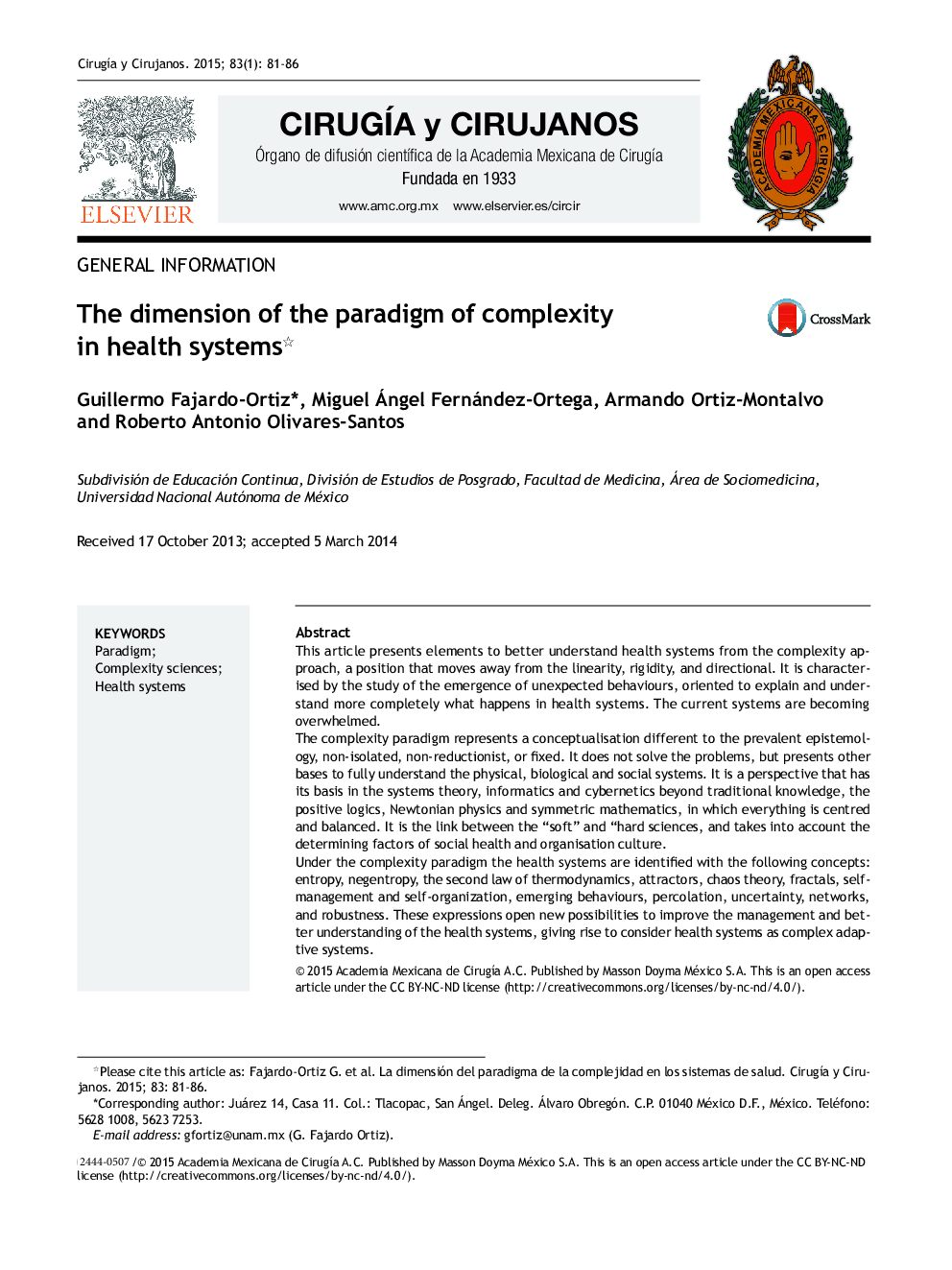| کد مقاله | کد نشریه | سال انتشار | مقاله انگلیسی | نسخه تمام متن |
|---|---|---|---|---|
| 4283472 | 1286888 | 2015 | 6 صفحه PDF | دانلود رایگان |

This article presents elements to better understand health systems from the complexity approach, a position that moves away from the linearity, rigidity, and directional. It is characterised by the study of the emergence of unexpected behaviours, oriented to explain and understand more completely what happens in health systems. The current systems are becoming overwhelmed.The complexity paradigm represents a conceptualisation different to the prevalent epistemology, non-isolated, non-reductionist, or fixed. It does not solve the problems, but presents other bases to fully understand the physical, biological and social systems. It is a perspective that has its basis in the systems theory, informatics and cybernetics beyond traditional knowledge, the positive logics, Newtonian physics and symmetric mathematics, in which everything is centred and balanced. It is the link between the “soft” and “hard sciences, and takes into account the determining factors of social health and organisation culture.Under the complexity paradigm the health systems are identified with the following concepts: entropy, negentropy, the second law of thermodynamics, attractors, chaos theory, fractals, self-management and self-organization, emerging behaviours, percolation, uncertainty, networks, and robustness. These expressions open new possibilities to improve the management and better understanding of the health systems, giving rise to consider health systems as complex adaptive systems.
ResumenSe presenta información para entender los sistemas de salud desde el enfoque de la complejidad, posición que se aparta de la linealidad, lo rígido y lo direccional, caracterizándose por el estudio del surgimiento de conductas inesperadas, orienta a explicar y entender en forma más completa lo que ocurre en los sistemas de salud; los esquemas actuales están llegando a su agotamiento.El paradigma de la complejidad representa una epistemología diferente de la prevalente, no aísla, no es reduccionista, ni «acartonada» en cuanto a saberes, ni pretende resolver problemas; presenta otras bases para conocer en forma más completa los sistemas físicos, biológicos y sociales. Tiene como fundamentos la teoría de sistemas, la informática y la cibernética, va más allá de los conocimientos tradicionales referentes a la lógica positivista, la física newtoniana y las matemáticas simétricas, en que hay equilibrios. Trata de vincular las ciencias «duras» y «blandas», tiene presente los determinantes sociales de la salud y la cultura organizacional.Mediante este paradigma, en los sistemas de salud hay «cuantización» y «matematización», manifestándose, entre otros, a través de la entropía, la neguentropía, la segunda ley de la termodinámica, los atractores, la teoría del caos, los fractales, la autogestión y autoorganización, las conductas emergentes, la percolación, la incertidumbre, las redes y la robustez; dichas expresiones abren nuevas posibilidades para conocer y mejorar los sistemas de salud, en cuanto a su gerencia, en que hay continuos zigzags, surgimientos, desapariciones, crecimientos, afirmaciones, negaciones y contradicciones, considerando a los sistemas de salud como sistemas complejos adaptativos.
Journal: Cirugía y Cirujanos (English Edition) - Volume 83, Issue 1, January–February 2015, Pages 81–86